Unit 8 Natural disasters Comic strip & Welcome to the unit 课件(共28张PPT)2023-2024学年牛津译林版八年级英语上册
文档属性
| 名称 | Unit 8 Natural disasters Comic strip & Welcome to the unit 课件(共28张PPT)2023-2024学年牛津译林版八年级英语上册 |

|
|
| 格式 | pptx | ||
| 文件大小 | 642.8KB | ||
| 资源类型 | 教案 | ||
| 版本资源 | 牛津译林版 | ||
| 科目 | 英语 | ||
| 更新时间 | 2024-01-17 14:25:54 | ||
图片预览

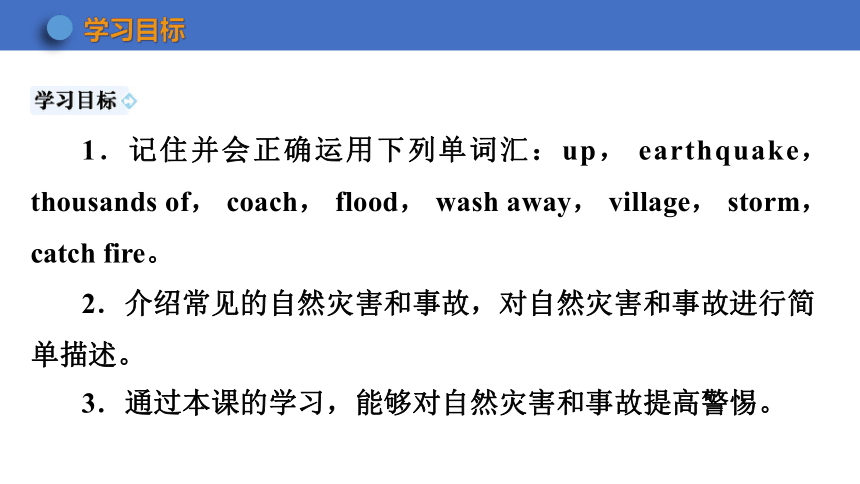
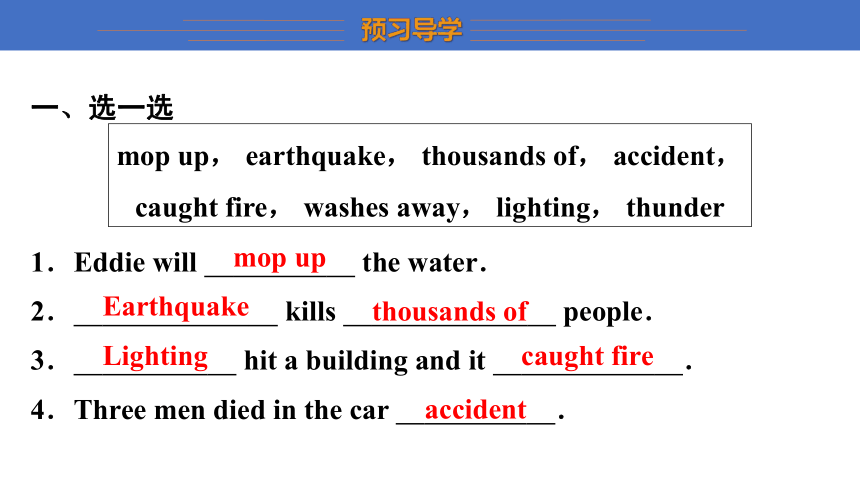
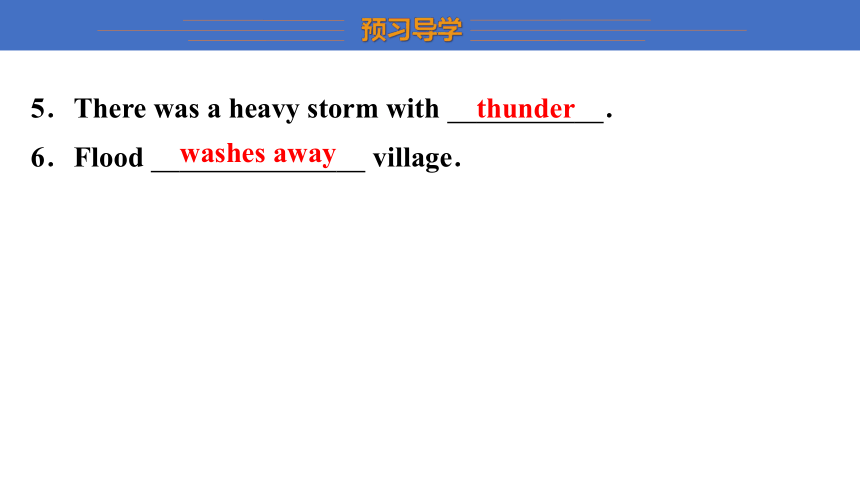
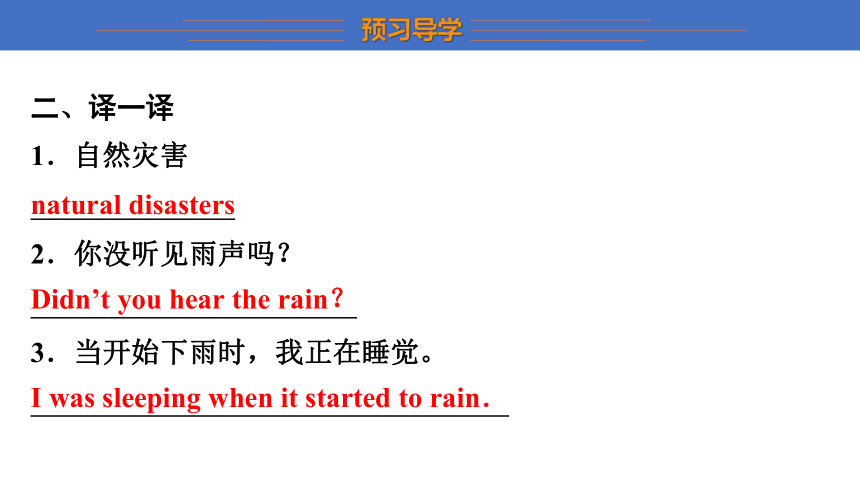
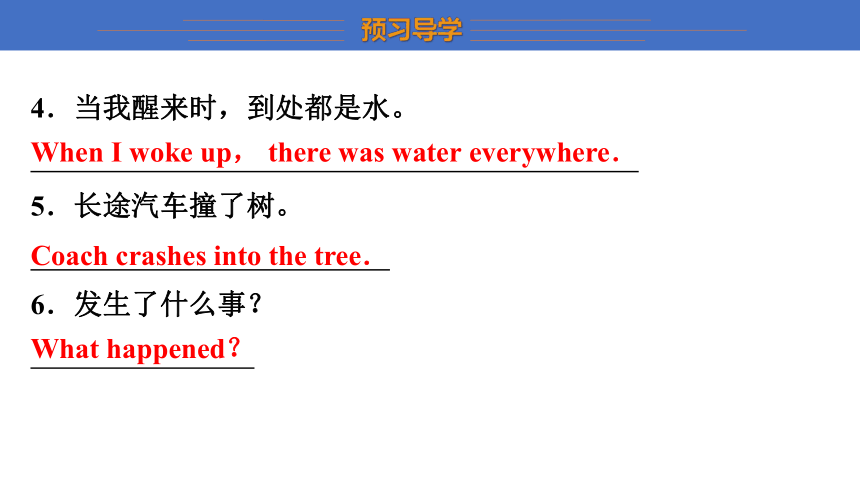
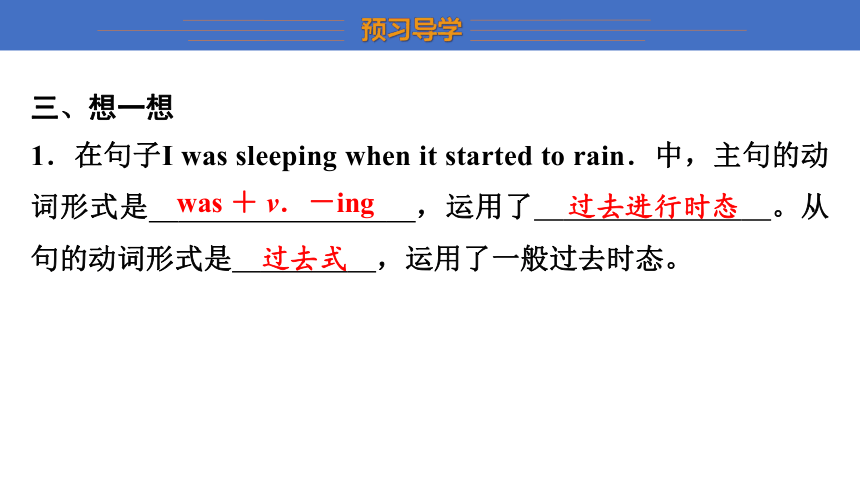

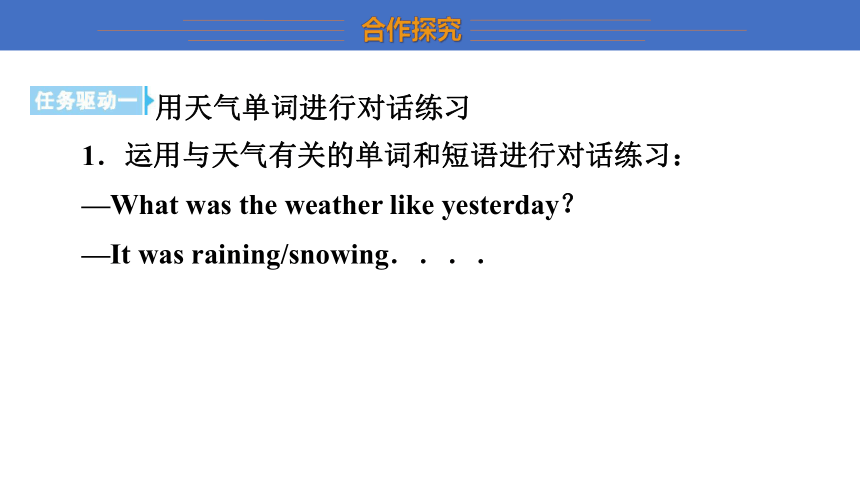
文档简介
(共28张PPT)
八年级·英语·译林版·上册
Unit 8 Natural disasters
Comic strip & Welcome to the unit
1.记住并会正确运用下列单词汇:up, earthquake, thousands of, coach, flood, wash away, village, storm, catch fire。
2.介绍常见的自然灾害和事故,对自然灾害和事故进行简单描述。
3.通过本课的学习,能够对自然灾害和事故提高警惕。
一、选一选
mop up, earthquake, thousands of, accident,
caught fire, washes away, lighting, thunder
1.Eddie will mop up the water.
2. Earthquake kills thousands of people.
3. Lighting hit a building and it caught fire .
4.Three men died in the car accident .
mop up
Earthquake
thousands of
Lighting
caught fire
accident
5.There was a heavy storm with thunder .
6.Flood washes away village.
thunder
washes away
二、译一译
1.自然灾害
natural disasters
2.你没听见雨声吗?
Didn’t you hear the rain?
3.当开始下雨时,我正在睡觉。
I was sleeping when it started to rain.
natural disasters
Didn’t you hear the rain?
I was sleeping when it started to rain.
4.当我醒来时,到处都是水。
When I woke up, there was water everywhere.
5.长途汽车撞了树。
Coach crashes into the tree.
6.发生了什么事?
What happened?
When I woke up, there was water everywhere.
Coach crashes into the tree.
What happened?
三、想一想
1.在句子I was sleeping when it started to rain.中,主句的动词形式是 was + v.-ing ,运用了 过去进行时态 。从句的动词形式是 过去式 ,运用了一般过去时态。
was + v.-ing
过去进行时态
过去式
2.你知道什么时候thousand后要加s,什么时候不加s吗?
thousand与 具体数字 连用,表示 确切的 数目时,其后不加s;与 of 连用,表示 不确切 的数量时,其后要加s,表示“成千上万的”的意思。
具体数字
确切的
of
不确切
用天气单词进行对话练习
1.运用与天气有关的单词和短语进行对话练习:
—What was the weather like yesterday?
—It was raining/snowing....
2.根据一些常见的自然灾害,请你运用下列句型,与搭档一起进行问答练习,并学习与自然灾害有关的新单词。
—Did you hear about earthquake?
—Yes, I did. Earthquake kills many people.
—Did you hear about flood?
—Yes, I did. Flood washes away some things.
读对话并分角色扮演
1.观看Eddie和Hobo之间的卡通视频,阅读漫画,弄清楚Hobo发生了什么事。
2.读Eddie和Hobo的对话并分角色扮演。
3.看课本第93页A部分的描述,猜猜哪些是对自然灾害的描述。然后核对答案。
4.两人一组讨论这些自然灾害,进行问答练习。完成任务所需的语言结构:
S1:Does earthquake kill thousands of people?
S2:Yes, it does.
S1:How many people does the car accident kill?
S2:Three.
5.听B部分的对话录音,然后小组结对练习B部分的对话。
·学习小助手·
练习对话时可适当扩展对话,比如在对话中替换不同的自然灾害的单词。
背诵并默写重点句型
1.背诵课本第92页和第93页上出现的重点句型,最好能够默写下来。
2.试着完成下面的短文。
Last week, there was a fire at Vivien’s school in the UK. Lightning caused the fire . There was a heavy storm with thunder and lightning. Lightning hit a classroom building and it caught fire. Luckily , nobody was hurt. It happened at night.
fire
Lightning
fire
storm
thunder
Luckily
由于短文内容偏难,你可以根据课本内容提示来完成。
·学习小助手·
●Who will mop up the water if I go home without you?如果你不跟我回家,谁来把水拖干净呢?
1.mop及物动词,意为“用拖把擦干净”。mop up意为“擦干,抹去”,是“动词+副词”结构的短语,如果其宾语是人称代词,人称代词要放在mop与up之间。例如:
The floor is dirty. Can you mop it up? 地板脏了。你能把它擦干净吗?
【拓展】mop还可用作可数名词,意为“拖把”。例如:
There are several mops in my house. 我家有几个拖把。
2.up副词,意为“完全地,彻底地”,用在某些动词之后,表示完结、用尽。例如:
I used up all the ink to write the novel. 写这部小说我用尽了所有的墨水。
【归纳】有关up的常见短语
pick up 捡起,拾起 look up 抬头看;查找
turn up (音量等)调大 get up 起床
up and down 上上下下 give up 放弃
catch up with 赶上 fix up 安装;修理
make up 编写 put up 举起;搭建
set up 创立,建立 cheer up 使……高兴起来
use up 用光,用尽 eat up 吃光
单项选择。
( A )1.The floor is dirty. Would you please ?
A.mop it up B.mop up it
C.to mop it up D.to mop up it
( A )2.The hungry dog all the food in the bowl.
A.ate up B.eat up
C.eat out D.ate out
A
A
●Flood washes away village. 洪水冲走了村庄。
wash away意为“冲走”,属于“动词+副词”结构,如果人称代词作宾语,人称代词要放在wash与away之间;若名词作宾语,名词可放于wash与away之间,也可放于away之后。例如:
The rain washed away the leaves on the road.雨水把路上的叶子冲走了。
The houses were on the hill and the flood washed them away. 房子在山上,洪水冲走了它们。
【拓展】与away相关的短语
move away 移开 put away 收拾
go away 离开 fly away 飞走
take away 拿走 far away 离……远
根据汉语提示完成句子。
1.So much water fell down from the mountain and washed away (冲走)many houses.
washed
away
2.Don’t put your bag there. The rain water will wash it away (把它冲走).
●Lightning hit a classroom building and it caught fire.一幢教学楼被闪电击中而着火了。
catch fire意为“着火”。 catch及物动词,意为“着火,开始燃烧”。例如:
wash
it
away
The paper in the waste paper basket catches fire. 在废纸篓中的纸着火了。
【拓展】catch还有“抓住,赶上,接住”之意。catch up with sb意为“赶上某人”; catch a cold意为“感冒”。例如:
I was a good player and I caught the ball well.我是个好运动员,我接球很好。
根据汉语提示完成句子。
昨天由于雷电,这个房子着火了。
The house caught fire because of the lightning yesterday.
caught
fire
八年级·英语·译林版·上册
Unit 8 Natural disasters
Comic strip & Welcome to the unit
1.记住并会正确运用下列单词汇:up, earthquake, thousands of, coach, flood, wash away, village, storm, catch fire。
2.介绍常见的自然灾害和事故,对自然灾害和事故进行简单描述。
3.通过本课的学习,能够对自然灾害和事故提高警惕。
一、选一选
mop up, earthquake, thousands of, accident,
caught fire, washes away, lighting, thunder
1.Eddie will mop up the water.
2. Earthquake kills thousands of people.
3. Lighting hit a building and it caught fire .
4.Three men died in the car accident .
mop up
Earthquake
thousands of
Lighting
caught fire
accident
5.There was a heavy storm with thunder .
6.Flood washes away village.
thunder
washes away
二、译一译
1.自然灾害
natural disasters
2.你没听见雨声吗?
Didn’t you hear the rain?
3.当开始下雨时,我正在睡觉。
I was sleeping when it started to rain.
natural disasters
Didn’t you hear the rain?
I was sleeping when it started to rain.
4.当我醒来时,到处都是水。
When I woke up, there was water everywhere.
5.长途汽车撞了树。
Coach crashes into the tree.
6.发生了什么事?
What happened?
When I woke up, there was water everywhere.
Coach crashes into the tree.
What happened?
三、想一想
1.在句子I was sleeping when it started to rain.中,主句的动词形式是 was + v.-ing ,运用了 过去进行时态 。从句的动词形式是 过去式 ,运用了一般过去时态。
was + v.-ing
过去进行时态
过去式
2.你知道什么时候thousand后要加s,什么时候不加s吗?
thousand与 具体数字 连用,表示 确切的 数目时,其后不加s;与 of 连用,表示 不确切 的数量时,其后要加s,表示“成千上万的”的意思。
具体数字
确切的
of
不确切
用天气单词进行对话练习
1.运用与天气有关的单词和短语进行对话练习:
—What was the weather like yesterday?
—It was raining/snowing....
2.根据一些常见的自然灾害,请你运用下列句型,与搭档一起进行问答练习,并学习与自然灾害有关的新单词。
—Did you hear about earthquake?
—Yes, I did. Earthquake kills many people.
—Did you hear about flood?
—Yes, I did. Flood washes away some things.
读对话并分角色扮演
1.观看Eddie和Hobo之间的卡通视频,阅读漫画,弄清楚Hobo发生了什么事。
2.读Eddie和Hobo的对话并分角色扮演。
3.看课本第93页A部分的描述,猜猜哪些是对自然灾害的描述。然后核对答案。
4.两人一组讨论这些自然灾害,进行问答练习。完成任务所需的语言结构:
S1:Does earthquake kill thousands of people?
S2:Yes, it does.
S1:How many people does the car accident kill?
S2:Three.
5.听B部分的对话录音,然后小组结对练习B部分的对话。
·学习小助手·
练习对话时可适当扩展对话,比如在对话中替换不同的自然灾害的单词。
背诵并默写重点句型
1.背诵课本第92页和第93页上出现的重点句型,最好能够默写下来。
2.试着完成下面的短文。
Last week, there was a fire at Vivien’s school in the UK. Lightning caused the fire . There was a heavy storm with thunder and lightning. Lightning hit a classroom building and it caught fire. Luckily , nobody was hurt. It happened at night.
fire
Lightning
fire
storm
thunder
Luckily
由于短文内容偏难,你可以根据课本内容提示来完成。
·学习小助手·
●Who will mop up the water if I go home without you?如果你不跟我回家,谁来把水拖干净呢?
1.mop及物动词,意为“用拖把擦干净”。mop up意为“擦干,抹去”,是“动词+副词”结构的短语,如果其宾语是人称代词,人称代词要放在mop与up之间。例如:
The floor is dirty. Can you mop it up? 地板脏了。你能把它擦干净吗?
【拓展】mop还可用作可数名词,意为“拖把”。例如:
There are several mops in my house. 我家有几个拖把。
2.up副词,意为“完全地,彻底地”,用在某些动词之后,表示完结、用尽。例如:
I used up all the ink to write the novel. 写这部小说我用尽了所有的墨水。
【归纳】有关up的常见短语
pick up 捡起,拾起 look up 抬头看;查找
turn up (音量等)调大 get up 起床
up and down 上上下下 give up 放弃
catch up with 赶上 fix up 安装;修理
make up 编写 put up 举起;搭建
set up 创立,建立 cheer up 使……高兴起来
use up 用光,用尽 eat up 吃光
单项选择。
( A )1.The floor is dirty. Would you please ?
A.mop it up B.mop up it
C.to mop it up D.to mop up it
( A )2.The hungry dog all the food in the bowl.
A.ate up B.eat up
C.eat out D.ate out
A
A
●Flood washes away village. 洪水冲走了村庄。
wash away意为“冲走”,属于“动词+副词”结构,如果人称代词作宾语,人称代词要放在wash与away之间;若名词作宾语,名词可放于wash与away之间,也可放于away之后。例如:
The rain washed away the leaves on the road.雨水把路上的叶子冲走了。
The houses were on the hill and the flood washed them away. 房子在山上,洪水冲走了它们。
【拓展】与away相关的短语
move away 移开 put away 收拾
go away 离开 fly away 飞走
take away 拿走 far away 离……远
根据汉语提示完成句子。
1.So much water fell down from the mountain and washed away (冲走)many houses.
washed
away
2.Don’t put your bag there. The rain water will wash it away (把它冲走).
●Lightning hit a classroom building and it caught fire.一幢教学楼被闪电击中而着火了。
catch fire意为“着火”。 catch及物动词,意为“着火,开始燃烧”。例如:
wash
it
away
The paper in the waste paper basket catches fire. 在废纸篓中的纸着火了。
【拓展】catch还有“抓住,赶上,接住”之意。catch up with sb意为“赶上某人”; catch a cold意为“感冒”。例如:
I was a good player and I caught the ball well.我是个好运动员,我接球很好。
根据汉语提示完成句子。
昨天由于雷电,这个房子着火了。
The house caught fire because of the lightning yesterday.
caught
fire
